 The real answer is that I choose books over the internet and social media. I choose to read books rather than browse Facebook, Instagram, or Pinterest. I choose books over blogs and forums and e-mail. The answer is not finding the time, it’s choosing how to spend it. Instead of going online frequently, I put limits on my social media time in favor of moderation. At the end of the day, for me, reading a book is more edifying and better for my well-being than reading through social media posts or falling down rabbit holes online. For me, it’s about putting the phone down and choosing something else. There is enough time for things we value.
The real answer is that I choose books over the internet and social media. I choose to read books rather than browse Facebook, Instagram, or Pinterest. I choose books over blogs and forums and e-mail. The answer is not finding the time, it’s choosing how to spend it. Instead of going online frequently, I put limits on my social media time in favor of moderation. At the end of the day, for me, reading a book is more edifying and better for my well-being than reading through social media posts or falling down rabbit holes online. For me, it’s about putting the phone down and choosing something else. There is enough time for things we value.
All in Bookish
 I hold Jeanne’s book in one hand and Jill’s note in the other. It’d be nice to have them both here, but holding their words is nice, too. And I have the words that fill my bookshelves. Maybe someday my words will slowly settle again onto the page. Maybe I’ll unpack my life and see what makes it work like I did with the books I studied in school. Maybe this is my next annotation.
I hold Jeanne’s book in one hand and Jill’s note in the other. It’d be nice to have them both here, but holding their words is nice, too. And I have the words that fill my bookshelves. Maybe someday my words will slowly settle again onto the page. Maybe I’ll unpack my life and see what makes it work like I did with the books I studied in school. Maybe this is my next annotation.
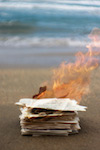 Don’t be surprised if you’re making bad art. Don’t be discouraged. And whatever you do, don’t stop. Keep making bad art. Not because you’re wrong about your self-evaluation — you might be producing some really awful stuff. But just because the thing you’re working on is a ripe mess doesn’t necessarily mean it’s time to stop working. On the contrary, that might be both the worst time and reason to quit. I think you need to make bad art in order to make anything better. I know that’s been the case for me.
Don’t be surprised if you’re making bad art. Don’t be discouraged. And whatever you do, don’t stop. Keep making bad art. Not because you’re wrong about your self-evaluation — you might be producing some really awful stuff. But just because the thing you’re working on is a ripe mess doesn’t necessarily mean it’s time to stop working. On the contrary, that might be both the worst time and reason to quit. I think you need to make bad art in order to make anything better. I know that’s been the case for me.
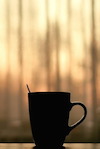 I am momentarily weightless standing here in the waning night, loose from sleep and freed by unfettered rest. Is it even right to be taking my emotional temperature this early in the morning? Shouldn’t I be telling myself how I feel? Brand new day! Clean slate! Expect to see God’s goodness! His mercies are new every morning! I do believe this. But some days it’s hard for the message to sink into my gut. I need extra time to dress myself in that truth.
I am momentarily weightless standing here in the waning night, loose from sleep and freed by unfettered rest. Is it even right to be taking my emotional temperature this early in the morning? Shouldn’t I be telling myself how I feel? Brand new day! Clean slate! Expect to see God’s goodness! His mercies are new every morning! I do believe this. But some days it’s hard for the message to sink into my gut. I need extra time to dress myself in that truth.
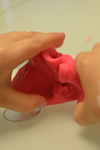 As much as motherhood has taken away — time to write, the ability to practice the piano without little hands taking over the keyboard ("Scooch, Mama”), the mental acuity to use polysyllabic words (or, some days, to finish sentences) — it has given me more. I have not lost myself in motherhood, as I had feared, but discovered myself. I don't just mean I've realized the beauty and joy of being a mother, but in and through motherhood I've grasped new ways of being creative. I learn creativity from my children, who are infinitely the same as and different from me; I learn creativity through my desire to create for them; I learn creativity simply by opening myself up to being something else.
As much as motherhood has taken away — time to write, the ability to practice the piano without little hands taking over the keyboard ("Scooch, Mama”), the mental acuity to use polysyllabic words (or, some days, to finish sentences) — it has given me more. I have not lost myself in motherhood, as I had feared, but discovered myself. I don't just mean I've realized the beauty and joy of being a mother, but in and through motherhood I've grasped new ways of being creative. I learn creativity from my children, who are infinitely the same as and different from me; I learn creativity through my desire to create for them; I learn creativity simply by opening myself up to being something else.
 For me, the empty pages tell the story of my life becoming occupied with things I never suspected would lead me from the corner booth at the coffee shop into the consuming risk and mess and joy and inertia of marrying a woman who beckons me out of isolation, of raising four beautiful and uniquely complex children, of moving from one city to another, of living in a community, and of following a vocation which, ironically, involves more writing than ever.
For me, the empty pages tell the story of my life becoming occupied with things I never suspected would lead me from the corner booth at the coffee shop into the consuming risk and mess and joy and inertia of marrying a woman who beckons me out of isolation, of raising four beautiful and uniquely complex children, of moving from one city to another, of living in a community, and of following a vocation which, ironically, involves more writing than ever.
 yet we have in our soil
yet we have in our soil
an inexhaustible mine
of true wealth,
the foundation of a nation’s
greatness,
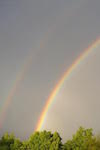 It was a few weeks into the class that I suddenly felt as though I was in the ocean, treading water with seasoned and well-equipped scuba divers. The language was the water surrounding me, warm and inviting, salty and buoyant but dark below. It was the darkness that drew me. As much as I tried to get in touch with the text, with the loss of Eden, I felt drawn to the darkness below and I swam in that.
It was a few weeks into the class that I suddenly felt as though I was in the ocean, treading water with seasoned and well-equipped scuba divers. The language was the water surrounding me, warm and inviting, salty and buoyant but dark below. It was the darkness that drew me. As much as I tried to get in touch with the text, with the loss of Eden, I felt drawn to the darkness below and I swam in that.
 It was in rereading the poems, though, that the poetry got left behind. I started reading these poems as prayers. And not prayers of the animals, but prayers for myself. These are prayers I would never know how to say, for the creature-like movements inside of me are intrinsically inarticulate. These poems are prayers for the animals inside of us — the heavy, slow, frightful, instinctive — those parts of us that fly and plod and bury down.
It was in rereading the poems, though, that the poetry got left behind. I started reading these poems as prayers. And not prayers of the animals, but prayers for myself. These are prayers I would never know how to say, for the creature-like movements inside of me are intrinsically inarticulate. These poems are prayers for the animals inside of us — the heavy, slow, frightful, instinctive — those parts of us that fly and plod and bury down.
 My experience has been that I mistake seasons of “creative dryness” for a season in which it is time to make something else. So, rather than simply waiting for the next moment of inspiration or the next deadline to move you into creative work, move yourself out of your normal discipline and do some painting, drawing, shooting, playing, etc. After all, you are a creature who creates — that is the core of who you are. What you make is secondary.
My experience has been that I mistake seasons of “creative dryness” for a season in which it is time to make something else. So, rather than simply waiting for the next moment of inspiration or the next deadline to move you into creative work, move yourself out of your normal discipline and do some painting, drawing, shooting, playing, etc. After all, you are a creature who creates — that is the core of who you are. What you make is secondary.
 Before, I’d wanted to be a fireman
Before, I’d wanted to be a fireman
and then an electrician
who climbed poles in snowstorms
and, for a spell, an architect.
But I knew the next morning
that it would be something else.
 Pulling a notepad out of your pocket
Pulling a notepad out of your pocket
bent with sitting, grimy and dog-eared
your pencil at the ready, you tumbled
like a bear out of the cab, writing as you ran
Toward the lamb just being born
toward the godly miracle of it, toward the sun
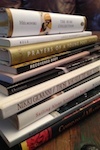 Poetry will never buy me bread or pay my rent. It will never pick up my children from school when I’m sick. It will not offer me a ride to the airport. Poetry will slip from my memory when I am old, phrases long memorized will most likely be buried under medical bills and compression hose and even so it will not forsake me completely. It will live deep in my cells, deep in my breath, deep in my history, and my making. It will buoy me when the water rises, when the dark falls, holding me with unseen hands, the memory of years past; words placed like pillars long forgotten.
Poetry will never buy me bread or pay my rent. It will never pick up my children from school when I’m sick. It will not offer me a ride to the airport. Poetry will slip from my memory when I am old, phrases long memorized will most likely be buried under medical bills and compression hose and even so it will not forsake me completely. It will live deep in my cells, deep in my breath, deep in my history, and my making. It will buoy me when the water rises, when the dark falls, holding me with unseen hands, the memory of years past; words placed like pillars long forgotten.
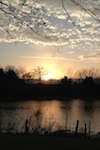 On this trip to Kentucky, I’m staying in a small cottage overlooking the pond at the back of Bethany Springs (the Thomas Merton Retreat Center), rather than at the monastery itself. Partly because of something I felt with renewed force when I finished reading Merton’s memoir last year. I am interested in neither a monastic life, nor an ascetic one. I’ll gladly stand with Jovinianus (and against St. Jerome, who identified this as an honest-to-God heresy, back in the year 393) in the declaration that abstinence from food is no better, in the eyes of God, than a thankful receiving of such. And you’ll find me much quicker these days to quote Mary Oliver’s “Wild Geese” than to agree with St Paul’s Greek-influenced dichotomy between spirit and flesh.
On this trip to Kentucky, I’m staying in a small cottage overlooking the pond at the back of Bethany Springs (the Thomas Merton Retreat Center), rather than at the monastery itself. Partly because of something I felt with renewed force when I finished reading Merton’s memoir last year. I am interested in neither a monastic life, nor an ascetic one. I’ll gladly stand with Jovinianus (and against St. Jerome, who identified this as an honest-to-God heresy, back in the year 393) in the declaration that abstinence from food is no better, in the eyes of God, than a thankful receiving of such. And you’ll find me much quicker these days to quote Mary Oliver’s “Wild Geese” than to agree with St Paul’s Greek-influenced dichotomy between spirit and flesh.
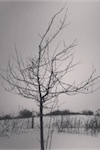 When I wash the dishes or grade the multiple choice quizzes, then, I try to cultivate my understanding of how those tasks fit into(yes!) the redemptive arc of history. Maybe I'm joining in God’s creative nature by creating babies and veggie stir-fry and quilts, by telling stories and painting with watercolors and making up silly songs and dances. Maybe I am making all things new by doing loads of laundry and getting dirty dishes to sparkle again. In each of these tasks, I am — hopefully — participating in God's plan to bring restoration to a broken world.
When I wash the dishes or grade the multiple choice quizzes, then, I try to cultivate my understanding of how those tasks fit into(yes!) the redemptive arc of history. Maybe I'm joining in God’s creative nature by creating babies and veggie stir-fry and quilts, by telling stories and painting with watercolors and making up silly songs and dances. Maybe I am making all things new by doing loads of laundry and getting dirty dishes to sparkle again. In each of these tasks, I am — hopefully — participating in God's plan to bring restoration to a broken world.
 Anyone who’s ever kept a journal — whether for brief reflections or recording prayers and petitions — can attest to writing as a powerful form of thinking, perhaps the most powerful. Even a very basic written account can provide order in a chaotic area, a structure when there seems to be little or none. Journaling helps move us toward greater internal clarity, cutting through the smokescreens of confusion or the ego. We may spot unhealthy patterns in our lives that we’ve blocked out, consciously or otherwise. Or we might work through a period of suffering in writing that spurs us toward the growth of the soul and invites us to live more fully — as Sarton puts it, moving “toward what we will become from where we are.”
Anyone who’s ever kept a journal — whether for brief reflections or recording prayers and petitions — can attest to writing as a powerful form of thinking, perhaps the most powerful. Even a very basic written account can provide order in a chaotic area, a structure when there seems to be little or none. Journaling helps move us toward greater internal clarity, cutting through the smokescreens of confusion or the ego. We may spot unhealthy patterns in our lives that we’ve blocked out, consciously or otherwise. Or we might work through a period of suffering in writing that spurs us toward the growth of the soul and invites us to live more fully — as Sarton puts it, moving “toward what we will become from where we are.”  Philip woke at eight the next morning and started the percolator. Around nine we decided that we wanted to treat everyone to coffee in their rooms, so I assembled the trays with pretty mugs and sprigs of holly and cream and sugar and, each carrying one, we ascended the stairs, grinning at one another like children. We delivered their coffee with bright greetings, and Philip started the fires in their rooms so that they could relax in bed for a while before breakfast. I told them we would eat in an hour: already the sacrosanct aromas of my mother’s Christmas Morning Breakfast Casserole, reserved for only the most special of occasions, was filling the air with invitation.
Philip woke at eight the next morning and started the percolator. Around nine we decided that we wanted to treat everyone to coffee in their rooms, so I assembled the trays with pretty mugs and sprigs of holly and cream and sugar and, each carrying one, we ascended the stairs, grinning at one another like children. We delivered their coffee with bright greetings, and Philip started the fires in their rooms so that they could relax in bed for a while before breakfast. I told them we would eat in an hour: already the sacrosanct aromas of my mother’s Christmas Morning Breakfast Casserole, reserved for only the most special of occasions, was filling the air with invitation.
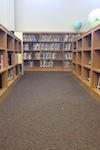 We love the idea of a room full of shelves, but surely the books want to be read, to be out in the world making connections. Do they whisper to the reader who gets lost between the shelves and then between the pages? And do the readers whisper back with each turn of the page? As a reader myself, I know how books have changed me. So likewise,does a book come back to the shelf somehow changed by the person who read it?
We love the idea of a room full of shelves, but surely the books want to be read, to be out in the world making connections. Do they whisper to the reader who gets lost between the shelves and then between the pages? And do the readers whisper back with each turn of the page? As a reader myself, I know how books have changed me. So likewise,does a book come back to the shelf somehow changed by the person who read it?
I have to believe that it does. A book that has been read and loved by a long chain of readers must carry that love with it until it simply falls apart.
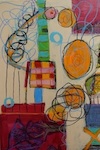 I have learned that on my own, in my response to the call of creation and the Creator, I am finite. I understand a few small truths and can reach only so far alone. I cannot teach myself all that I need to know and understand. When I find myself pushing the constraints of this finitude, I need the gifts of others to pull me through the fog into the next clearing. I will not reach my destination — nor even understand it — without them. I would like to. I long for independence and self-actualization. I want to do things on my own. But the fact is, I lack much.
I have learned that on my own, in my response to the call of creation and the Creator, I am finite. I understand a few small truths and can reach only so far alone. I cannot teach myself all that I need to know and understand. When I find myself pushing the constraints of this finitude, I need the gifts of others to pull me through the fog into the next clearing. I will not reach my destination — nor even understand it — without them. I would like to. I long for independence and self-actualization. I want to do things on my own. But the fact is, I lack much.
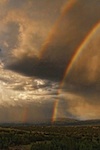 I had thought that this Catholic Mass would be so very different from the evangelical style of worship I was trying to take a break from. And I’d hoped, though I’d hardly admitted it to myself, that I might feel differently here, among the pillars and marble.
I had thought that this Catholic Mass would be so very different from the evangelical style of worship I was trying to take a break from. And I’d hoped, though I’d hardly admitted it to myself, that I might feel differently here, among the pillars and marble. But too much of it was familiar — the anemic guitar, the warbly singers, the optimistic lyrics. Sitting uncomfortably among the singing believers a burn of anxiety scrambled up my esophagus. I was irritated. The air conditioning irritated me. The music irritated me. The congregation irritated me. And my headache showed no signs of abating. Communion was coming, I knew that much from reading ahead in the program. I began to plan my escape.














